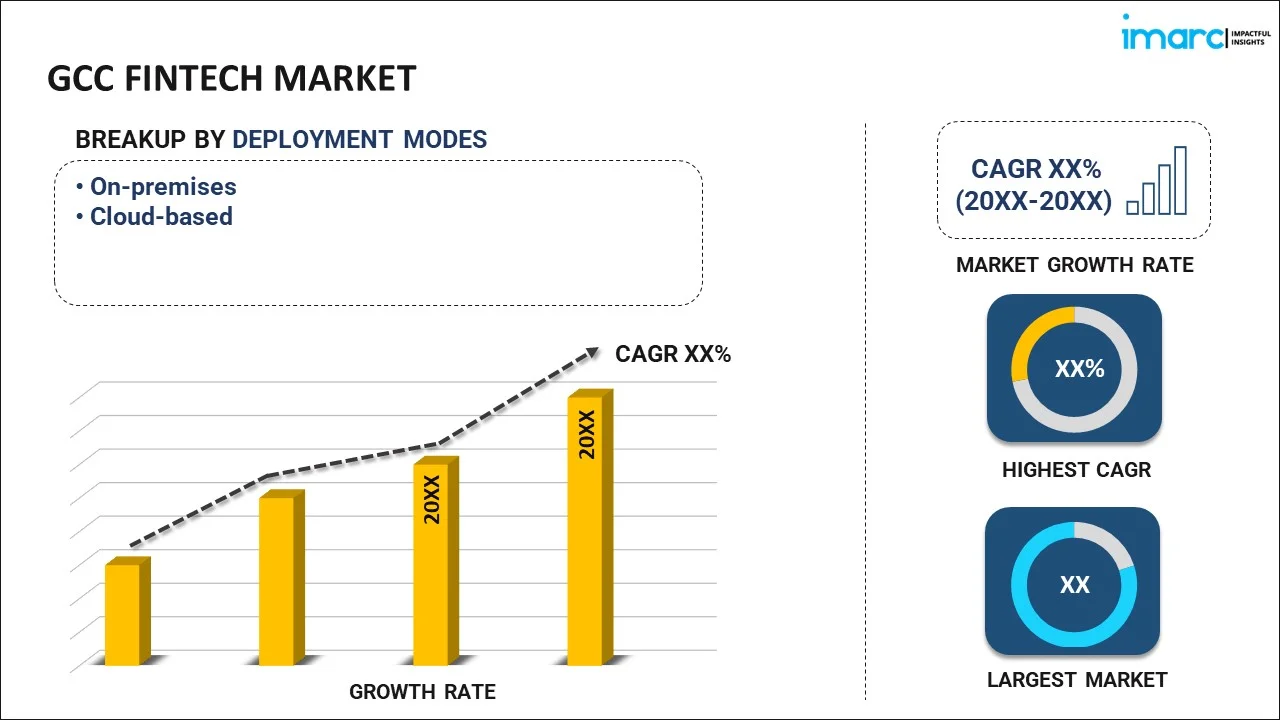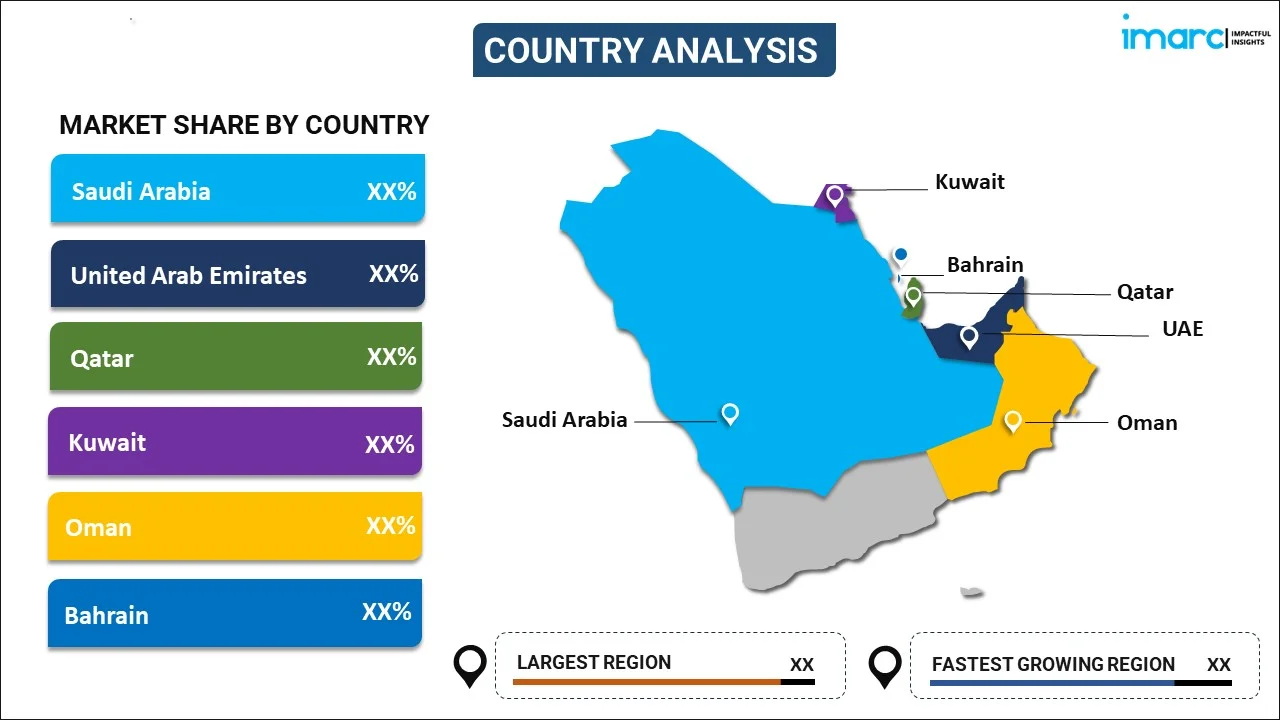
GCC Fintech Market Report by Deployment Mode (On-premises, Cloud-based), Technology (Application Programming Interface, Artificial Intelligence, Blockchain, Robotic Process Automation, Data Analytics, and Others), Application (Payment and Fund Transfer, Loans, Insurance and Personal Finance, Wealth Management, and Others), End User (Banking, Insurance, Securities, and Others), and Country 2026-2034
Market Overview:
The GCC fintech market size reached USD 7.3 Billion in 2025. Looking forward, IMARC Group expects the market to reach USD 26.8 Billion by 2034, exhibiting a growth rate (CAGR) of 15.52% during 2026-2034. The presence of supportive ecosystems for entrepreneurs, including incubators and venture capital, increasing emphasis on sustainable and responsible financial practices, and the integration of fintech with healthcare payment systems to accelerate transaction process represent some of the key factors driving the market.
|
Report Attribute
|
Key Statistics
|
|---|---|
|
Base Year
|
2025
|
|
Forecast Years
|
2026-2034
|
|
Historical Years
|
2020-2025
|
|
Market Size in 2025
|
USD 7.3 Billion |
|
Market Forecast in 2034
|
USD 26.8 Billion |
| Market Growth Rate 2026-2034 | 15.52% |
Access the full market insights report Request Sample
Fintech, also known as financial technology, refers to the integration of technology into financial services to improve, automate, and modernize their delivery and use. It encompasses several technologies, including software, algorithms, and systems, to provide innovative solutions in the financial sector. It streamlines financial processes through automation, facilitates interaction between different financial systems, and is available across various platforms and devices. It tailors financial products to individual user needs and adheres to regulatory standards and legal requirements. It easily integrates with existing financial systems and evolves with new technological advancements. It can handle varying volumes of transactions and offers clear visibility into financial processes. It provides immediate data and analytics for decision-making and encourages paperless transactions and digital solutions. It facilitates investment management online and enables banking services through smartphones and tablets. It supports buying, selling, and managing cryptocurrencies and connects borrowers with individual lenders. It employs algorithms to detect and prevent fraudulent activities and simplifies online payment for e-commerce. Besides this, it reduces the cost of transactions by cutting out intermediaries, leading to competitive pricing for businesses and consumers.
GCC Fintech Market Trends:
Rise in Open Banking
Open banking in the GCC region involves regulatory frameworks that allow secure sharing of customer financial data between banks and third-party service providers through Application Programming Interfaces (APIs). According to the GCC fintech market forecast, the adoption of open banking is expected to significantly boost innovation and competition within the financial services sector in GCC in coming future. For instance, in June 2024, Saudi entrepreneurs launched a fintech startup, Thimsa, to facilitate instant B2B payments and payouts in the UAE and Bahrain, targeting the region’s open banking growth. The platform aims to access shared financial data via 350 integrated APIs and accept payments in over 60 currencies from more than 150 countries. This trend aims to foster competition and innovation in financial services by enabling new players to offer tailored products, such as personalized budgeting tools, enhanced payment solutions, and lending services. Open banking helps create a more customer-centric financial ecosystem by allowing users to have greater control over their data and to benefit from more integrated and efficient banking services. Countries in the region are actively adopting these regulations, which, in turn, is contributing to the GCC fintech market growth.
Increase in Adoption of Cryptocurrency and Blockchain
Cryptocurrency and blockchain adoption are growing in the GCC region, driven by interest in decentralized finance (DeFi) and secure transaction systems. Blockchain's ability to enhance transparency, reduce fraud, and streamline processes is being applied across sectors, from banking to supply chain management. GCC governments, such as the UAE and Bahrain, are also exploring blockchain for digital identities and smart contracts. Meanwhile, cryptocurrencies like Bitcoin and Ethereum are gaining traction, with local exchanges and structured products emerging to support crypto trading and investment. For instance, in October 2024, National Bank of Bahrain (NBB) and ARP Digital have launched the GCC’s first Bitcoin-linked Structured Investment. The investment offers accredited investors exposure to Bitcoin's growth while ensuring capital preservation, with 100% protection on the downside. The initiative reflects Bahrain's position as a leading fintech hub and showcases NBB's role in advancing financial innovation in the region. This development reflects the region's increasing focus on fintech innovation and digital transformation.
Advanced Payment Solutions
Advanced payment solutions are gaining momentum in GCC fintech industry, with the widespread adoption of digital wallets and contactless payments. Digital wallets, such as Apple Pay, Google Pay, and local solutions like STC Pay, allow users to store payment information securely and make transactions via smartphones or wearables. Contactless payments, supported by near-field communication (NFC) technology, let users complete transactions by tapping their device or card, offering convenience and speed. These solutions are increasingly popular due to their ease of use, enhanced security features, and growing consumer preference for cashless transactions, especially post-pandemic. In line with this, in September 2024, Tabby, the leading shopping and financial services app in the MENA region, finalized its acquisition of Tweeq, a Saudi-based digital wallet licensed by the Saudi Central Bank. The acquisition will enable Tabby to broaden its product offerings by providing customers with spending accounts and money management tools. Advanced payment solutions are gaining momentum in the GCC fintech industry, significantly increasing the overall GCC fintech market share.
GCC Fintech Market Segmentation:
IMARC Group provides an analysis of the key trends in each segment of the GCC fintech market report, along with forecasts at the regional and country levels for 2026-2034. Our report has categorized the market based on deployment mode, technology, application, and end user.
Deployment Mode Insights:

To get detailed segment analysis of this market Request Sample
- On-premises
- Cloud-based
The report has provided a detailed breakup and analysis of the market based on the deployment mode. This includes on-premises and cloud-based.
Technology Insights:
- Application Programming Interface
- Artificial Intelligence
- Blockchain
- Robotic Process Automation
- Data Analytics
- Others
A detailed breakup and analysis of the market based on the technology has also been provided in the report. This includes application programming interface, artificial intelligence, blockchain, robotic process automation, data analytics, and others.
Application Insights:
- Payment and Fund Transfer
- Loans
- Insurance and Personal Finance
- Wealth Management
- Others
A detailed breakup and analysis of the GCC fintech market based on the application has also been provided in the report. This includes payment and fund transfer, loans, insurance and personal finance, wealth management, and others.
End User Insights:
- Banking
- Insurance
- Securities
- Others
The report has provided a detailed breakup and analysis of the market based on the end user. This includes banking, insurance, securities, and others.
Country Insights:

To get detailed regional analysis of this market Request Sample
- Saudi Arabia
- UAE
- Qatar
- Bahrain
- Kuwait
- Oman
The report has also provided a comprehensive analysis of all the major regional markets, which include Saudi Arabia, UAE, Qatar, Bahrain, Kuwait, and Oman.
Competitive Landscape:
The report has also provided a comprehensive analysis of the competitive landscape in the market. Competitive analysis such as market structure, key player positioning, top winning strategies, competitive dashboard, and company evaluation quadrant has been covered in the report. Also, detailed profiles of all major companies have been provided.
GCC Fintech Market News:
- In September 2024, Xpence and Paymob partnered at the 24 Fintech conference in Riyadh to enhance digital payments for SMEs across the GCC. This collaboration will integrate Paymob's advanced payment processing technology into Xpence's platform, enabling seamless online and in-person card payments for businesses in the region. The strategic move aims to empower businesses in the rapidly evolving digital economy and set a new standard for digital payments in the GCC.
- In October 2024, Mashreq introduced the NEO CORP digital banking platform in Kuwait, catering to corporate clients. The platform aims to enhance customer experience by providing efficient cash management and trade services through an intuitive interface. It offers real-time data and analytics capabilities for informed decision-making and operates with advanced security features.
GCC Fintech Market Report Coverage:
| Report Features | Details |
|---|---|
| Base Year of the Analysis | 2025 |
| Historical Period | 2020-2025 |
| Forecast Period | 2026-2034 |
| Units | Billion USD |
| Scope of the Report | Exploration of Historical and Forecast Trends, Industry Catalysts and Challenges, Segment-Wise Historical and Predictive Market Assessment:
|
| Deployment Modes Covered | On-premises, Cloud-based |
| Technologies Covered | Application Programming Interface, Artificial Intelligence, Blockchain, Robotic Process Automation, Data Analytics, Others |
| Applications Covered | Payment and Fund Transfer, Loans, Insurance and Personal Finance, Wealth Management, Others |
| End Users Covered | Banking, Insurance, Securities, Others |
| Countries Covered | Saudi Arabia, UAE, Qatar, Bahrain, Kuwait, Oman |
| Customization Scope | 10% Free Customization |
| Post-Sale Analyst Support | 10-12 Weeks |
| Delivery Format | PDF and Excel through Email (We can also provide the editable version of the report in PPT/Word format on special request) |
Key Questions Answered in This Report:
- How big is the fintech market in the GCC?
- How has the GCC fintech market performed so far and how will it perform in the coming years?
- What has been the impact of COVID-19 on the GCC fintech market?
- What is the breakup of the GCC fintech market on the basis of deployment mode?
- What is the breakup of the GCC fintech market on the basis of technology?
- What is the breakup of the GCC fintech market on the basis of application?
- What is the breakup of the GCC fintech market on the basis of end user?
- Which region secured the largest market share?
- What are the various stages in the value chain of the GCC fintech market?
- What are the key driving factors and challenges in the GCC Fintech market?
- What is the structure of the GCC fintech market and who are the key players?
- What is the degree of competition in the GCC fintech market?
Key Benefits for Stakeholders:
- IMARC’s report offers a comprehensive quantitative analysis of various market segments, historical and current market trends, market forecasts, and dynamics of the GCC fintech market from 2020-2034.
- The research study provides the latest information on the market drivers, challenges, and opportunities in the GCC fintech market.
- Porter's five forces analysis assist stakeholders in assessing the impact of new entrants, competitive rivalry, supplier power, buyer power, and the threat of substitution. It helps stakeholders to analyze the level of competition within the GCC fintech industry and its attractiveness.
- Competitive landscape allows stakeholders to understand their competitive environment and provides an insight into the current positions of key players in the market.
Need more help?
- Speak to our experienced analysts for insights on the current market scenarios.
- Include additional segments and countries to customize the report as per your requirement.
- Gain an unparalleled competitive advantage in your domain by understanding how to utilize the report and positively impacting your operations and revenue.
- For further assistance, please connect with our analysts.
 Request Customization
Request Customization
 Speak to an Analyst
Speak to an Analyst
 Request Brochure
Request Brochure
 Inquire Before Buying
Inquire Before Buying




.webp)




.webp)












